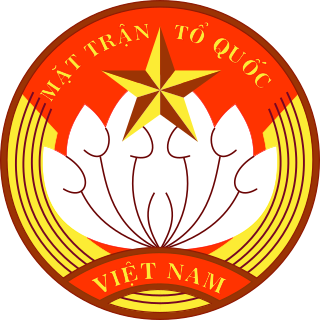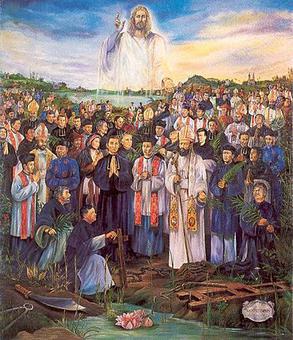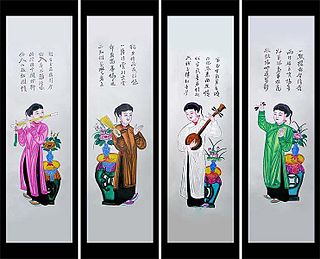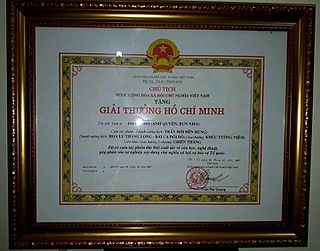Related Research Articles

Hồ Chí Minh, colloquially known as Uncle Ho or just Uncle (Bác), and by other aliases and sobriquets, was a Vietnamese communist revolutionary, nationalist, and politician. He served as Prime Minister of the Democratic Republic of Vietnam from 1945 to 1955, and as President from 1945 until his death in 1969. Ideologically a Marxist–Leninist, he was the Chairman and First Secretary of the Workers' Party of Vietnam, the predecessor of the current Communist Party of Vietnam.

The Vietnamese Fatherland Front is an umbrella group of mass movements in Vietnam aligned with the Communist Party of Vietnam forming the Vietnamese government. It was founded in February 1977 by the merger of the Vietnamese Fatherland Front of North Vietnam and two Viet Cong groups, the National Liberation Front of South Vietnam and the Alliance of National, Democratic, and Peace Forces. It is an amalgamation of many smaller groups, including the Communist Party itself. Other groups that participated in the establishment of the Front were the Vietnam General Confederation of Labour, the Ho Chi Minh Communist Youth Union and the Ho Chi Minh Young Pioneer Organization. It also included the Democratic Party of Vietnam and Socialist Party of Vietnam, until they disbanded in 1988. It also incorporates some officially sanctioned religious groups.
Articles related to Vietnam and Vietnamese culture include:
Protestants in Vietnam are a religious minority, constituting 1% of the population in 2022. Though its numbers are small, Protestantism is the country's fastest-growing religion, growing at a rate of 600% in the early 2000s.

Hải Dương is a city in Vietnam. It is the capital of Hải Dương, an industrialized province in the Hanoi Capital Region and the Red River Delta in Northern Vietnam. The city is at the midpoint between the capital Hanoi and the major port Haiphong, and is part of the Northern Key Economic Zone. In 2019, Hai Duong city had a population of 507,469.

The majority of Vietnamese do not follow any organized religion, instead participating in one or more practices of folk religions, such as venerating ancestors, or praying to deities, especially during Tết and other festivals. Folk religions were founded on endemic cultural beliefs that were historically affected by Confucianism and Taoism from ancient China, as well as by various strands of Buddhism. These three teachings or tam giáo were later joined by Christianity which has become a significant presence. Vietnam is also home of two indigenous religions: syncretic Caodaism and quasi-Buddhist Hoahaoism.
Vietnamese National Football Super Cup, also called the Thaco National Football Super Cup due to sponsorship reasons, is Vietnamese football's annual match contested between the champions of the previous V.League 1 season and the holders of the Vietnamese Cup. If the V.League 1 champions also won the Vietnamese Cup, then the league runners-up provide the opposition. The fixture was first played in the 1998–99 season.

Vietnamese Martyrs or Saint Andrew Dung-Lac and Companions, also known as the Martyrs of Annam, Martyrs of Tonkin and Cochinchina, Martyrs of Indochina, are saints on the General Roman Calendar who were canonized by Pope John Paul II. On June 19, 1988, thousands of Overseas Vietnamese worldwide gathered at the Vatican for the Celebration of the Canonization of 117 Vietnamese Martyrs, an event chaired by Monsignor Trần Văn Hoài. Their memorial is on November 24.

Thích Quảng Độ was a Vietnamese Buddhist monk and scholar who was the patriarch of the Unified Buddhist Church of Vietnam (UBCV) from 2008 until his death. Since the execution of his master at the hands of the communist Việt Minh in his teenage years, Thích Quảng Độ had been involved in political activism, firstly against the anti-Buddhist policies of the Catholic President of South Vietnam Ngô Đình Diệm. After the fall of Saigon, the UBCV was banned by the communist government, and as one of the senior monks in the organisation, Thích Quảng Độ was at the forefront of the UBCV's defiance of the government, refusing to join the government-endorsed Vietnamese Buddhist Church. He was detained repeatedly by the communist authorities in the last 45 years of his life for his resistance and criticism of their policies, particularly his calls for multi-party democracy. During the Vietnam War period, he also served as a university academic in Buddhism, translated sutras and wrote books, notably a nine-volume Buddhist encyclopedia, and two-volume dictionary between Vietnamese and Sino-Vietnamese.

Christianity was first introduced to Vietnam in the 16th century. Catholics and Protestants were reported to constitute 7% and 2% of the country's population respectively in 2020;. In the past Christian foreign missionaries are not allowed to proselytize or perform religious activities without government approval.

Đồng Sĩ Nguyên, also spelled Đồng Sỹ Nguyên, other name Nguyễn Hữu Vũ, was a Vietnamese soldier and politician. He was Deputy Prime Minister of Vietnam, a member of the Politburo of the Communist Party of Vietnam, lieutenant-general of the North Vietnamese Army, and minister of transport of Vietnam. He was born in Quảng Bình Province, home to general Võ Nguyên Giáp and Ngô Đình Diệm, president of the Republic of Vietnam.
Nguyễn Hồng Quang is the Vietnamese pastor and lawyer, general secretary and vice-president of the Mennonite Church in Vietnam, chairman of the Legal Committee of the Vietnam Evangelical Fellowship.

The Metropolitan Archdiocese of Hanoi is a Catholic metropolitan archdiocese of Vietnam. It is one of the earliest in the history of the Catholic Church in Vietnam.
While the Constitution of Vietnam officially provides for freedom of religion, in practice the government imposes a range of legislative measures restricting religious practice. All religious groups must register and seek approval from the government. The government requires all Buddhist monks to be approved by and work under the officially recognized Buddhist organization, the Vietnam Buddhist Sangha (VBS). The number of Buddhist student monks is controlled and limited by the Committee on Religious Affairs. According to a 2020 report by Human Rights Watch, prohibited religious activities are those deemed to be contrary to arbitrary notions of the "national interest", "public order", or "national unity". Unrecognized religious groups, including Cao Đài, Hòa Hảo, and some Christian, and Buddhist groups face "constant surveillance and harassment". Some religious groups may be subject to "public criticism, forced renunciation of faith, detention, interrogation, torture, and imprisonment." Laws continue to be applied unevenly however, with some local government areas taking a more relaxed and tolerant approach than others.
The Ministry of Industry and Trade is the government ministry in Vietnam responsible for the advancement, promotion, governance, regulation, management and growth of industry and trade. The former Ministry of Trade has its origins in 1945 with the formation of the modern National Unification Cabinet, and became a ministry in its own right in 1955. The Ministry of Trade merged with the Ministry of Industry in 2007 to form the Ministry of Industry and trade. The current Minister of Industry and Trade is Nguyễn Hồng Diên. Ministry main offices are located in Hanoi.

The Hồ Chí Minh Prize is an honorary award given by the government of Vietnam in recognition of cultural and/or scientific achievement. The prize was established by decree in 1981, and has been awarded in 1996, 2000, 2005 and 2012, often posthumously. The prize is named for Ho Chi Minh, who was Chairman and founder of the Workers' Party of Vietnam, that is considered one of the highest honors bestowed by Vietnam.

Nguyễn Tường Tam better known by his pen-name Nhất Linh was a Vietnamese writer, editor and publisher in colonial Hanoi. He founded the literary group and publishing house Tự Lực Văn Đoàn in 1932 with the literary magazines Phong Hóa and Ngày Nay ("Today"), and serialized, then published, many of the influential realism-influenced novels of the 1930s.
Vietnamese Revolutionary Youth League, or Thanh Niên for short, was founded by Nguyen Ai Quoc in Guangzhou in the spring of 1925. It is considered as the “first truly Marxist organization in Indochina” and “the beginning of Vietnamese Communism”. With the support of Chinese Communist Party and the Kuomintang Left, during the period of 1925-1927, the League managed to educate and train a considerable number of Marxist-Leninist revolutionaries, preparing the prominent leadership for the Communist Party of Vietnam and the Vietnamese Revolution. At the time, Vietnam was part of colonial French Indochina.
The HUS High School for Gifted Students, commonly known as High School for Gifted Students of Science, is a specialized, most-selective public magnet school of VNU University of Science, a member of Vietnam National University, Hanoi system. The school serves as a national educational institution to nurture talented Vietnamese students who excelled at natural sciences. The largest percentage of its graduates attend the most prestigious universities in Vietnam.

Võ Văn Thưởng is a Vietnamese politician serving as the President of Vietnam since 2023, being the youngest person to serve in this position since the country's reunification. As the country's head of state, Thưởng is the second highest official in Vietnam after Nguyễn Phú Trọng, the general secretary of the Communist Party of Vietnam.
References
- ↑ Mennonite World Conference, Living out the gospel as received, mwc-cmm.org, Canada, August 3, 2022
- ↑ "Vietnam: Attack on Mennonites Highlights Religious Persecution". Human rights watch. October 22, 2004. Archived from the original on 2006-05-09. Retrieved 2007-05-06.
- ↑ World Christian Encyclopedia 2nd edition (Oxford University Press, 2001), first volume, p. 806
- ↑ Compass Direct, Activist Christian Pastor Arrested In Vietnam, christianitytoday.com, USA, August 1, 2001
- ↑ Kenneth Chan, Vietnam Court to Hear Appeal of Mennonite Six Members Today, christianpost.com, USA, April 12, 2005
- 1 2 "Hanoi officially recognises Baptists and Mennonites", Asia News, October 2007.